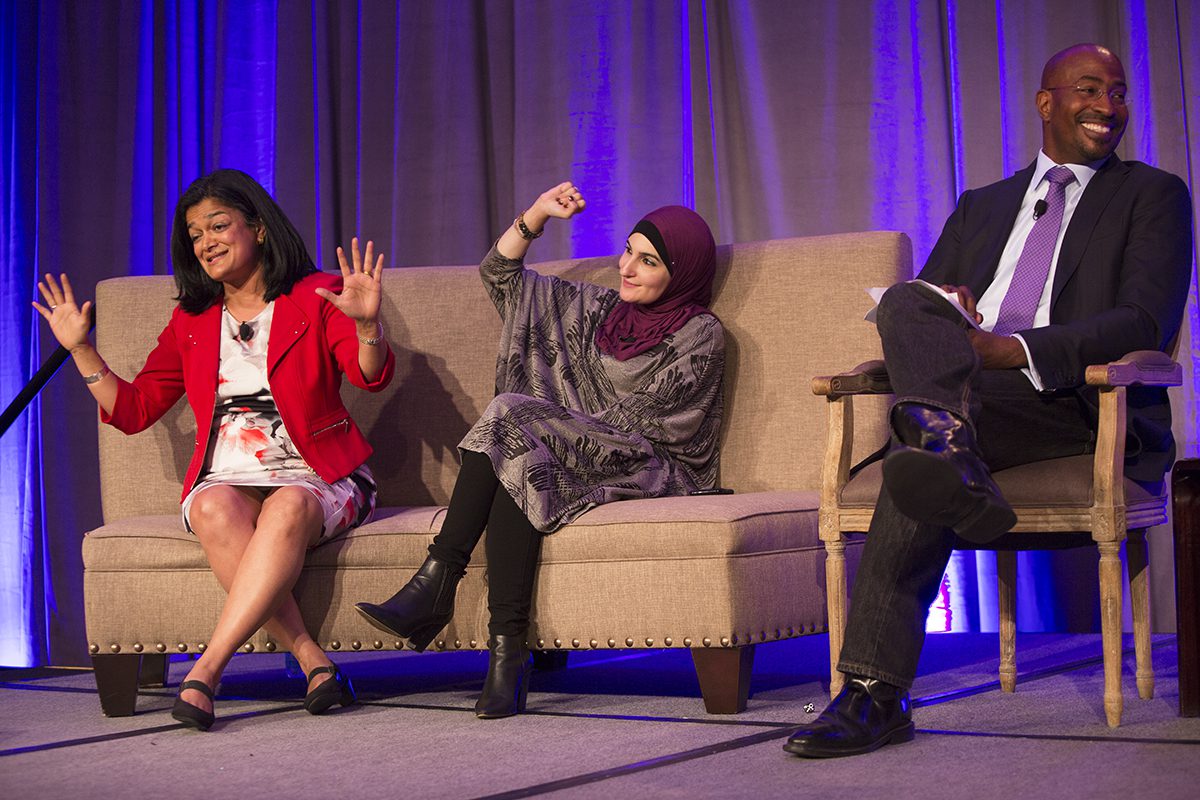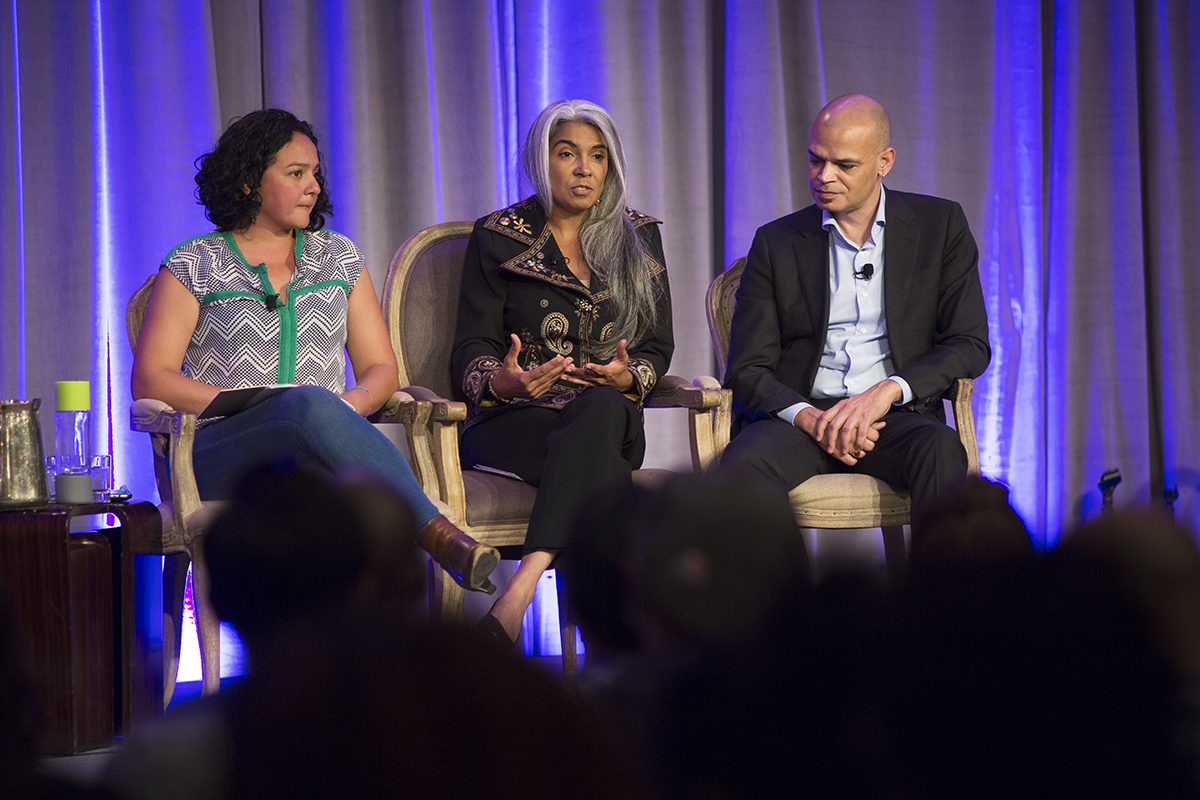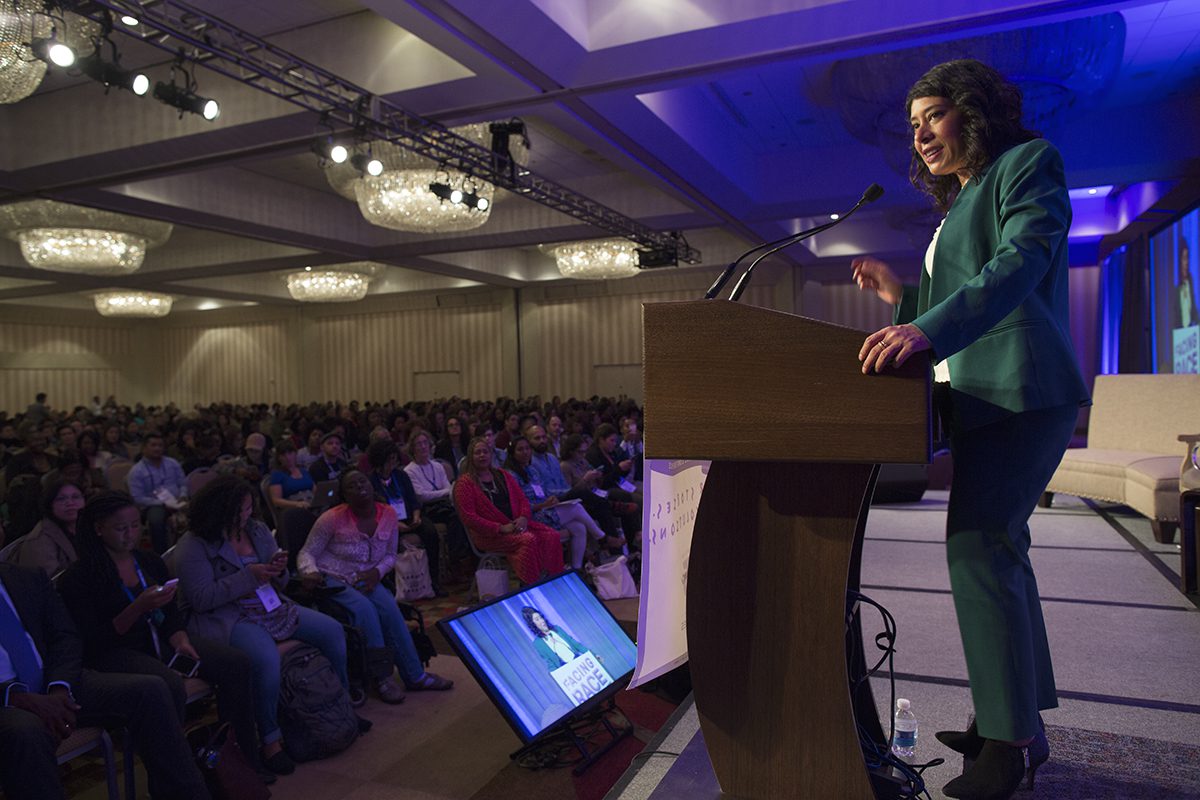Nearly to a person, the 2,300 attendees at last week’s Facing Race conference—and most of the speakers—said, at some point in the weekend that the gathering was “just where I need to be right now.”
Just days after Election Day, of course the election’s results were on everyone’s minds, and the shock and horror, fear and disappointment that much of America felt was very much present. Along with exhaustion.
But there was also the perspective and resilience of organizers and fighters. Unity within and among the various movements—queer, disabled, Black, Latinx, Asian, Native, Muslim, Jew, undocumented, and women—being needed now more than was a major theme of the conference.
The final panel of the event was set aside for discussion of “Where Do We Go from Here,” which I’m sure was a very different conversation than the one the panelists were expecting to have when they signed up.
The panel was moderated by Van Jones, president of Rebuild the Dream, known for his work on expanding “green-collar jobs” and connecting them to those who need them most. Jones is also a CNN commentator and joked about how relieved he was to be on stage without a Trump supporter on either side of him.
(Left to Right: Pramila Jayapal, Linda Sarsour, and Van Jones, Photo Credit: Race Forward, Facing Race National Conference)
Jones was also perhaps one of the most optimistic speakers of the event:
“The biggest danger we have is misreading the moment,” he opened. “We’ve gone from saying Trump is joke, he’s an idiot . . . we’ve gone from totally underestimating him to ‘He’s God, and we’re dead.’”
Jones cautioned the audience against the despair of that position, noting that “His coalition is not as stable as it was. This is not a Republican takeover. It’s an alliance between populists and conservatives, and they don’t agree on everything. (Though they agree that they hate us.)” He brought up the Trans-Pacific Partnership trade deal and privatizing social security/Medicare as items where Trump breaks from his hard-right Republican colleagues.
Jones even extended this idea to Trump’s voting coalition, saying, “You would think listening to liberals that 60 million Klan members just revealed themselves. You would think that they endorse every thing he says. They tolerate things he said, but don’t endorse them. There are people who told me that they voted for Trump but if he does anything hostile to American Muslims, they’ll be in the streets. A majority of his voters don’t trust him, don’t like him, know he has a bad temper.”
Even if you aren’t feeling that generous, Jones reminded everyone that as racial justice advocates, “We are less alone now than we’ve ever been,” reminding them a majority of voters voted against him, and that “tens of millions of white people are shocked and heartbroken,” and tens of millions of people of color are kicking themselves for not voting.
“I’m convinced that if the organizations in this room want to go big and beautiful and amazing on opposition, I think you will be shocked by how responsive our allies are,” he offered.
Pramila Jayapal, a Washington state senator who was just elected to the House of Represenatives (as the first Indian-American woman to serve there), reminded the audience of some silver linings, such as the fact that Arizona, even while going for Trump, also raised the minimum wage and kicked out the notoriously anti-immigrant Sheriff Joe Arapio. “There are a lot of women of color getting elected,” she observed.
Linda Sarsour, executive director of the Arab American Association of New York, admitted to exhaustion. “Double down?” she asked. “I was giving all that I got. Those of you who haven’t been all in it, this is time to take the load.”
Sarsour also made several calls to give fellow activists the benefit of the doubt, whether it was in terms of constantly mentioning all the causes we support (“Don’t believe that if I don’t mention you, I’m not including you.”) or not assuming that people who are working inside the system are sell-outs. “When I see Van Jones sitting down to talk to Trump voters,” she said, I think, “that’s my brother doing something I don’t want to do.”
Sarsour also issued one of many calls to white people to stand up: “It doesn’t take a lot of courage to stand up to Donald Trump,” she said. “It takes courage to stand up to your family” and “When there’s that Muslim registration program, I want the first 8,000 people on the list to be white people.”
“I’m focused on local elections in 2017; then in 2018 we have an opportunity to Tea Party them,” she concluded.
Marisa Franco, of #Not1More Deportation, had some sobering and important perspective: “For a lot of us, Trump’s America is already here,” she noted. “We already live and organize in red states.”
When asked how Arapio was defeated, she said “the people who he denigrated and abused are the people who took his ass out.” They brought the direct action people together with electoral action people. Undocumented people took the streets and stopped hiding. “A lot of people came together because we had a common enemy.”
It’s been hard on the left to get to a shared agenda, said Franco. “How are we going to get to a shared agenda if we don’t feel like we’re going to have a shared political fate?” said Franco, trailing off with a very clear implication that now we all do.
(Left to Right, Marisa Franco, Kara Denise Brewer Boyd, and Glenn Harris, Photo Credit: Race Forward, Facing Race National Conference)
Kara Denise Brewer Boyd, director of Association of American Indian Farmers took the perspective one step further: “We’ve been under attack and defending this homeland since 1492,” she noted, and spoke of the hope of having the largest gathering of different indigenous nations ever right now at Standing Rock, fighting the Dakota Access Pipeline. “We feel like we’re in a space where we can hold this. We can do this, we can win.”
Glenn Harris, of the Center for Social Inclusion made a call for local organizing and change. “We need to be clear: We don’t compromise on misogyny or racism. Period. This is a whitelash against our success,” she said. But, the work “has always been local. Change we want is never going to come from on high. So, it’s important to hold onto what does local success look like? It can’t just be about resistance. It has to keep being about a vision.”
One theme of the panel, also taken up by Rinku Sen, director of Race Forward, which put on the conference, was one that is fairly controversial among anti-racist organizers in the election aftermath—whether all Trump voters should be written off as hopeless racists because they were willing to overlook so much racism in voting for him.
The panel leaned toward no. “When we say someone is being racist, we’re saying something bad, but on the level of a traffic ticket,” said Jones. That’s because we understand implicit bias, natural prejudice, structural racism, he argued, so we know that everyone participates in a racist system, and racist things can result from actions that were not consciously hateful. But for many people who, “it sounds like 14 felonies with capital punishment. It lands like a bomb on them. We’re talking about something totally different.”
“There’s elitist blind spots on our sides, and bigoted blind spots on their sides,” he said, “But the strange thing is that idea that voting for someone who is bigoted makes you racist is consolidating the Republican coalition.” Jones actually feared that that consolidation might make it more difficult to capitalize on the inevitable moment when it becomes clear that he can’t deliver on the economic promises he has made.
Jayapal, whose district is largely white, agreed. “When we mention race, the immediate reaction is ‘Are you calling me racist?’ she said. “We have to figure out how to have that conversation differently. We do not want to compromise with racism, but we also do not want to build Trump’s coalition for him.”
(Rinku Sen, photo courtsey of Race Forward, Facing Race National Conference)
Sen put out a call to action, saying: “White people, especially poor and working class have a stake in this too—those are our people, we have to go get them. There are going to be a lot of people who are going to be sorely disappointed by the results of this election. We have to be there for them when it happens.”
“I cannot just roll my eyes and let the autocrats have my people. People don’t know that you don’t have to be intentionally hateful to cause damage for people of color, women. . . My instinct with the Trump voter is to love on them so hard is that every time they turn around one of us there is inviting them to something. We have to stick to them like glue.
“Every one of us had a role to play in the outcome of this election,” Sen went on. “I told you so is not helpful. We cannot berate ourselves into better strategy. But we do need self-reflection. Whose warning did I not heed? What was I unwilling to try? Let’s not make the mistake that what we don’t want to do = what shouldn’t be done.”
Images courtesy of Race Forward: The Center for Racial Justice Innovation.









Comments